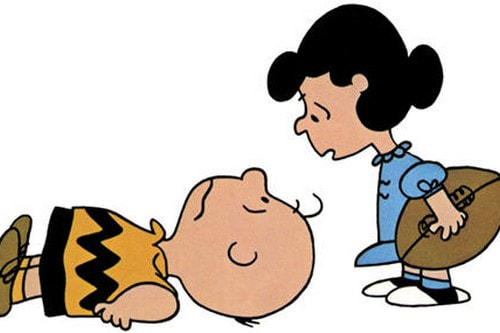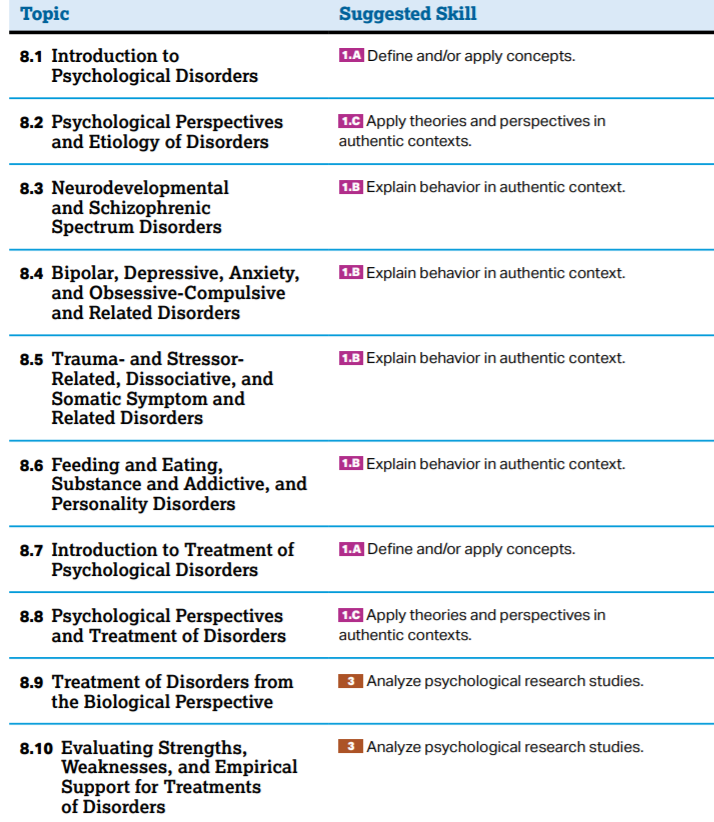Psychological Disorders & Treatment
How do psychologists measure and define abnormal behavior? What is the Diagnostic and Statistical Manual-5-TR that is published by the American Psychiatric Association? How are the various psychological disorders identified, studied, and what impact do these disorders have on individuals, families, communities and society? We will begin this unit with a discussion on the various criteria psychologists have used to define what is normal behavior. We will give specific attention to the cause and diagnostic criteria for disorders such as anxiety, somatoform, mood, schizophrenic, organic, personality and dissociative.
We will discuss the varying perspectives on how to address abnormal behavior.
What are the categories of mental health therapies? How might therapists draw from a variety of techniques when treating psychological disorders? Psychologists and other practitioners use practices that are based on a variety of treatment orientations. In this unit, you will be introduced to the characteristics of treatment as they are influenced by the following perspectives: behavioral, humanistic, psychoanalytic/psychodynamic, cognitive-behavioral, and biological. We will make connections to earlier definitions of personality as advanced by these same perspectives. Finally, we will examine how psychotherapy is ultimately an integration of assorted techniques into a single, coherent system.
Unit Objectives
1. Identify the criteria for judging whether behavior is psychologically disordered, and discuss the controversy over the diagnosis of attention-deficit hyperactivity disorder.
2. Contrast the medical model of psychological disorders with the biopsychosocial approach to disordered behavior.
3. Describe the goals and content of the DSM-5-TR, and discuss the potential dangers and benefits of using diagnostic labels.
Anxiety Disorders
4. Define anxiety disorders, and contrast the symptoms of generalized anxiety disorder and panic disorder.
5. Explain how a phobia differs from the fears we all experience.
6. Describe the symptoms of obsessive-compulsive disorder.
7. Describe the symptoms of post-traumatic stress disorder, and discuss survivor resiliency.
8. Discuss the contributions of the learning and biological perspectives to understanding the development of anxiety disorders.
Somatoform Disorders
9. Describe somatoform disorders, and explain how the symptoms differ from other physical symptoms.
Dissociative Disorders
10. Describe the symptoms of dissociative disorders.
11. Define dissociative identity disorder, and discuss the controversy regarding its diagnosis.
Mood Disorders
12. Define mood disorders, and contrast major depressive disorder and bipolar disorder
13. Explain the development of mood disorders, paying special attention to the biological and social-cognitive perspectives.
Schizophrenia
14. Describe the symptoms of schizophrenia, and differentiate delusions and hallucinations.
15. Distinguish the five subtypes of schizophrenia, and contrast chronic and acute schizophrenia.
16. Outline some abnormal brain chemistry, functions, and structures associated with schizophrenia, and discuss the possible link between prenatal viral infections and schizophrenia.
17. Discuss the evidence for a genetic contribution to the development of schizophrenia, and describe some psychological factors that may be early warning signs of schizophrenia in children.
Personality Disorders
18. Contrast the three clusters of personality disorders, and describe the behaviors and brain activity associated with antisocial personality disorder.
Rates of Psychological Disorders
19. Discuss the prevalence of psychological disorders, and summarize the findings on the link between poverty and serious psychological disorders.
General Overview Question
20. Discuss how psychotherapy, biomedical therapy, and an eclectic approach to therapy differ.
Psychotherapies
21. Define psychoanalysis, and discuss the aims, methods, and criticisms of this form of therapy.
22. Contrast psychodynamic therapy and interpersonal therapy with traditional psychoanalysis.
23. Identify the basic characteristics of the humanistic therapies, and describe the specific goals and techniques of Carl Rogers’ client-centered therapy.
24. Explain how the basic assumption of behavior therapy differs from those of traditional psycho-analytic and humanistic therapies, and describe the techniques used in exposure therapies and aversive conditioning.
25. State the main premise of therapy based on operant conditioning principles, and describe the views of proponents and critics of behavior modification.
26. Contrast cognitive therapy and cognitive-behavioral therapy, and give some examples of cognitive therapy for depression.
27. Discuss the rationale and benefits of group therapy, including family therapy.
Evaluating Psychotherapies
28. Explain why clients and clinicians tend to overestimate the effectiveness of psychotherapy, and describe two phenomena that contribute to clients’ and clinicians’ misperceptions in this area.
29. Discuss some of the findings of outcome studies in judging the effectiveness of psychotherapies, and describe which psychotherapies are most effective for specific disorders.
30. Evaluate the effectiveness of eye movement desensitization and reprocessing (EMIR) and light exposure therapies.
31. Describe the three benefits attributed to all psychotherapies.
32. Discuss the role of values and cultural differences in the therapeutic process, and identify some guidelines for selecting a therapist.
The Biomedical Therapies
33. Define psychopharmacology, and explain how double-blind studies help researchers evaluate a drug’s effectiveness.
34. Describe the characteristics of antipsychotic, antianxiety, antidepressant, and mood-stabilizing drugs, and discuss their use in treating psychological disorders.
35. Describe the use of brain stimulation techniques and psychosurgery in treating specific disorders.
36. Explain how therapeutic life-style change reflects the idea that humans are integrated biopsychosocial systems.
Preventing Psychological Disorders
37. Explain the rationale of preventive mental health programs.
Resources
Psychopathology -DISCOVERING PSYCHOLOGY
Psychotherapy-DISCOVERING PSYCHOLOGY
Khan Academy Videos
The World of Abnormal Psychology Videos
Howie Mandel and OCD
Highlights of Changes of DSM-IV-TR to DSM-5
Psychological Disorders: Crash Course Psychology #28
OCD & Anxiety Disorders: Crash Course Psychology #29
Depressive and Bipolar Disorders: Crash Course Psychology #30
Trauma & Addiction: Crash Course Psychology #31
Schizophrenia & Dissociative Disorders: Crash Course Psychology #32
Eating and Body Dysmorphic Disorders: Crash Course Psychology #33
Personality Disorders: Crash Course Psychology #34
Getting Help - Psychotherapy: Crash Course Psychology #35
Biomedical Treatments: Crash Course Psychology #36
We will discuss the varying perspectives on how to address abnormal behavior.
What are the categories of mental health therapies? How might therapists draw from a variety of techniques when treating psychological disorders? Psychologists and other practitioners use practices that are based on a variety of treatment orientations. In this unit, you will be introduced to the characteristics of treatment as they are influenced by the following perspectives: behavioral, humanistic, psychoanalytic/psychodynamic, cognitive-behavioral, and biological. We will make connections to earlier definitions of personality as advanced by these same perspectives. Finally, we will examine how psychotherapy is ultimately an integration of assorted techniques into a single, coherent system.
Unit Objectives
1. Identify the criteria for judging whether behavior is psychologically disordered, and discuss the controversy over the diagnosis of attention-deficit hyperactivity disorder.
2. Contrast the medical model of psychological disorders with the biopsychosocial approach to disordered behavior.
3. Describe the goals and content of the DSM-5-TR, and discuss the potential dangers and benefits of using diagnostic labels.
Anxiety Disorders
4. Define anxiety disorders, and contrast the symptoms of generalized anxiety disorder and panic disorder.
5. Explain how a phobia differs from the fears we all experience.
6. Describe the symptoms of obsessive-compulsive disorder.
7. Describe the symptoms of post-traumatic stress disorder, and discuss survivor resiliency.
8. Discuss the contributions of the learning and biological perspectives to understanding the development of anxiety disorders.
Somatoform Disorders
9. Describe somatoform disorders, and explain how the symptoms differ from other physical symptoms.
Dissociative Disorders
10. Describe the symptoms of dissociative disorders.
11. Define dissociative identity disorder, and discuss the controversy regarding its diagnosis.
Mood Disorders
12. Define mood disorders, and contrast major depressive disorder and bipolar disorder
13. Explain the development of mood disorders, paying special attention to the biological and social-cognitive perspectives.
Schizophrenia
14. Describe the symptoms of schizophrenia, and differentiate delusions and hallucinations.
15. Distinguish the five subtypes of schizophrenia, and contrast chronic and acute schizophrenia.
16. Outline some abnormal brain chemistry, functions, and structures associated with schizophrenia, and discuss the possible link between prenatal viral infections and schizophrenia.
17. Discuss the evidence for a genetic contribution to the development of schizophrenia, and describe some psychological factors that may be early warning signs of schizophrenia in children.
Personality Disorders
18. Contrast the three clusters of personality disorders, and describe the behaviors and brain activity associated with antisocial personality disorder.
Rates of Psychological Disorders
19. Discuss the prevalence of psychological disorders, and summarize the findings on the link between poverty and serious psychological disorders.
General Overview Question
20. Discuss how psychotherapy, biomedical therapy, and an eclectic approach to therapy differ.
Psychotherapies
21. Define psychoanalysis, and discuss the aims, methods, and criticisms of this form of therapy.
22. Contrast psychodynamic therapy and interpersonal therapy with traditional psychoanalysis.
23. Identify the basic characteristics of the humanistic therapies, and describe the specific goals and techniques of Carl Rogers’ client-centered therapy.
24. Explain how the basic assumption of behavior therapy differs from those of traditional psycho-analytic and humanistic therapies, and describe the techniques used in exposure therapies and aversive conditioning.
25. State the main premise of therapy based on operant conditioning principles, and describe the views of proponents and critics of behavior modification.
26. Contrast cognitive therapy and cognitive-behavioral therapy, and give some examples of cognitive therapy for depression.
27. Discuss the rationale and benefits of group therapy, including family therapy.
Evaluating Psychotherapies
28. Explain why clients and clinicians tend to overestimate the effectiveness of psychotherapy, and describe two phenomena that contribute to clients’ and clinicians’ misperceptions in this area.
29. Discuss some of the findings of outcome studies in judging the effectiveness of psychotherapies, and describe which psychotherapies are most effective for specific disorders.
30. Evaluate the effectiveness of eye movement desensitization and reprocessing (EMIR) and light exposure therapies.
31. Describe the three benefits attributed to all psychotherapies.
32. Discuss the role of values and cultural differences in the therapeutic process, and identify some guidelines for selecting a therapist.
The Biomedical Therapies
33. Define psychopharmacology, and explain how double-blind studies help researchers evaluate a drug’s effectiveness.
34. Describe the characteristics of antipsychotic, antianxiety, antidepressant, and mood-stabilizing drugs, and discuss their use in treating psychological disorders.
35. Describe the use of brain stimulation techniques and psychosurgery in treating specific disorders.
36. Explain how therapeutic life-style change reflects the idea that humans are integrated biopsychosocial systems.
Preventing Psychological Disorders
37. Explain the rationale of preventive mental health programs.
Resources
Psychopathology -DISCOVERING PSYCHOLOGY
Psychotherapy-DISCOVERING PSYCHOLOGY
Khan Academy Videos
The World of Abnormal Psychology Videos
Howie Mandel and OCD
Highlights of Changes of DSM-IV-TR to DSM-5
Psychological Disorders: Crash Course Psychology #28
OCD & Anxiety Disorders: Crash Course Psychology #29
Depressive and Bipolar Disorders: Crash Course Psychology #30
Trauma & Addiction: Crash Course Psychology #31
Schizophrenia & Dissociative Disorders: Crash Course Psychology #32
Eating and Body Dysmorphic Disorders: Crash Course Psychology #33
Personality Disorders: Crash Course Psychology #34
Getting Help - Psychotherapy: Crash Course Psychology #35
Biomedical Treatments: Crash Course Psychology #36

